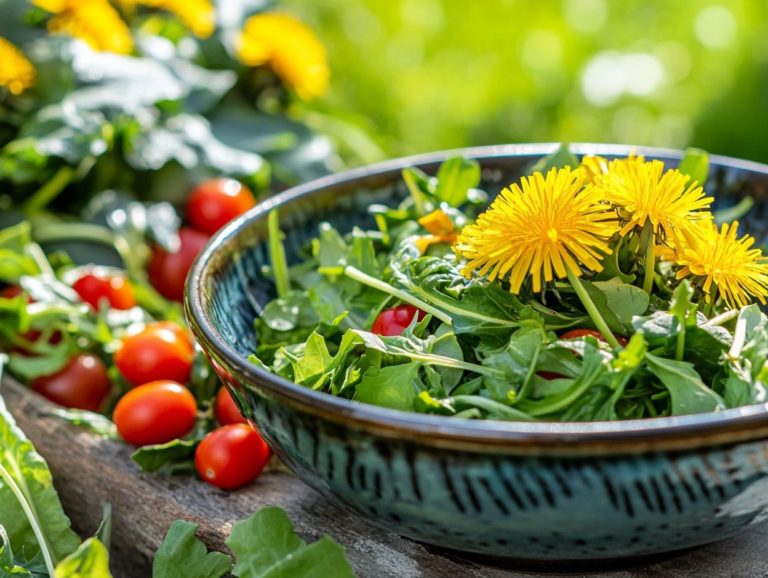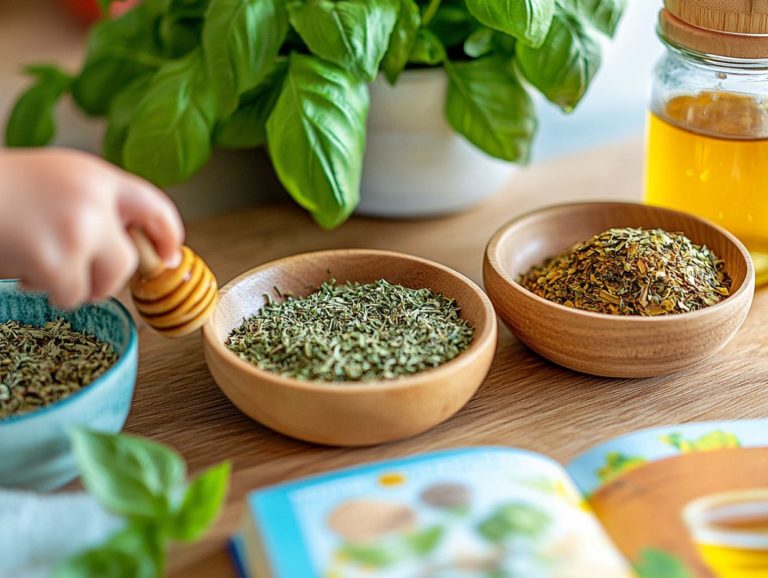The Top 10 Kitchen Herbs and Their Benefits
Herbs transcend mere flavor enhancers; they serve as a gateway to a multitude of health benefits that can elevate your dishes and enhance your overall well-being.
Discover the top 10 kitchen herbs now to boost your health! Each herb is brimming with nutrients and distinctive qualities. Whether it s the versatility of basil or the robust antioxidants found in rosemary, these herbs not only enhance your dishes but also offer natural remedies for everyday ailments.
Dive into the exciting world of these herbs and discover their health benefits!
Contents
- Key Takeaways:
- 1. Basil: A Versatile and Nutrient-Rich Herb
- 2. Rosemary: A Powerful Antioxidant
- 3. Thyme: A Natural Remedy for Cough and Cold
- 4. Oregano: A Natural Antibacterial and Anti-inflammatory
- 5. Mint: A Soothing Herb for Digestive Issues
- 6. Sage: A Traditional Herb for Memory and Cognitive Function
- 7. Cilantro: A Detoxifying Herb for Heavy Metal Removal
- Herbs: Not Just for Garnishing; They Can Transform Your Meals and Boost Your Health!
- 8. Parsley: A Nutrient-Dense Herb for Bone Health
- 9. Dill: A Flavorful Herb with Antioxidant Properties
- 10. Chives: A Mildly Onion-Flavored Herb with Antioxidant Benefits
- How to Incorporate These Herbs into Your Cooking?
- Frequently Asked Questions
- What are the top 10 kitchen herbs and their benefits?
- What are the benefits of using rosemary in cooking?
- How can thyme benefit my health?
- Why should I use basil in my cooking?
- What are the benefits of adding mint to my meals?
- What are the health benefits of using sage?
- Why is parsley a must-have kitchen herb?
Key Takeaways:
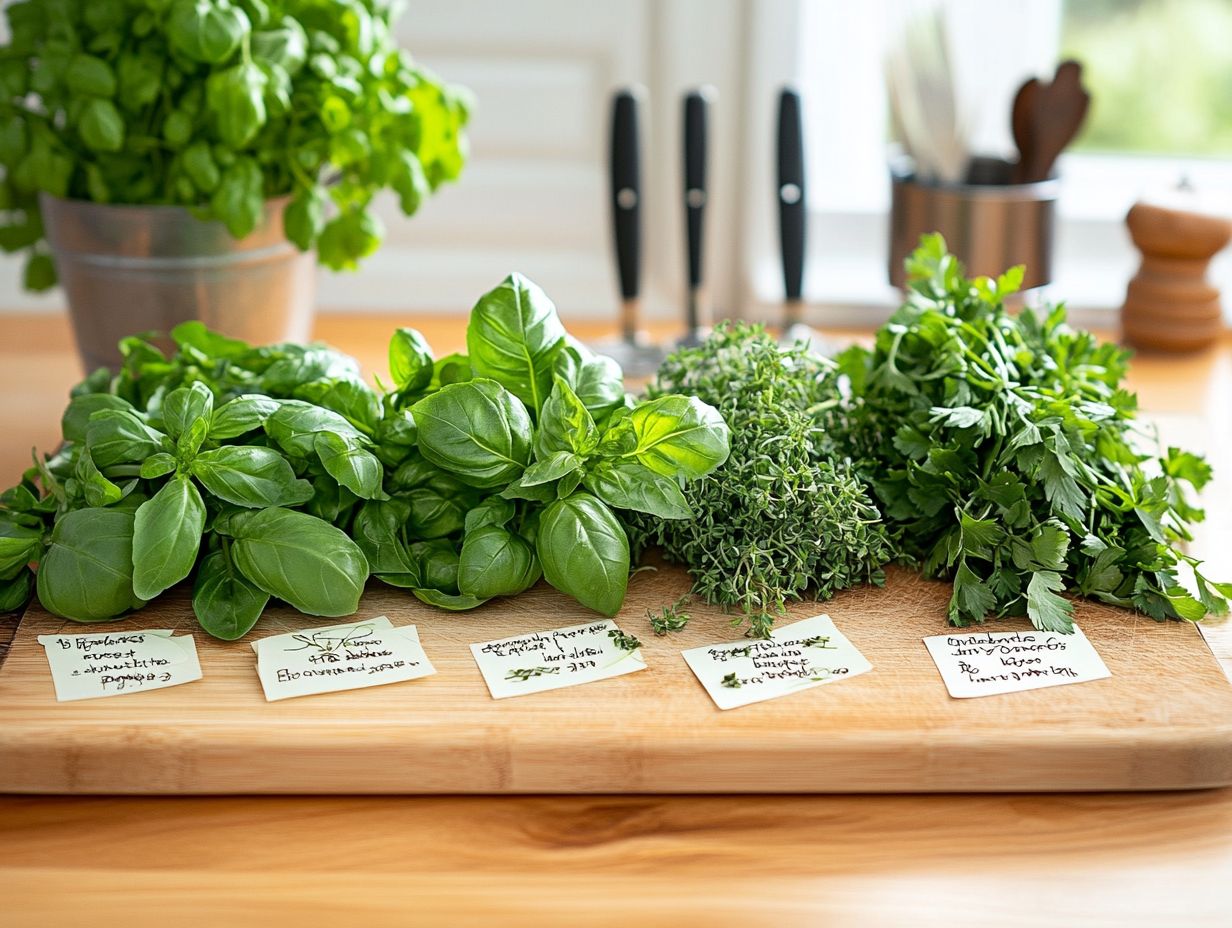
1. Basil: A Versatile and Nutrient-Rich Herb
Basil, a cornerstone of Mediterranean cuisine, is celebrated for its remarkable versatility, infusing a unique flavor and aroma that can elevate everything from cozy family meals to gourmet dishes.
This nutrient-rich herb is a culinary delight that offers many health benefits, making it essential for any garden.
You ll find several varieties of basil, including:
- Sweet basil
- Thai basil
- Lemon basil
Each variety adds its own unique touch to your dishes. Sweet basil, with its rich and sweet flavor, is essential in pesto and pairs beautifully with tomato-based meals. Thai basil, in contrast, has an anise-like flavor that complements stir-fries and curries perfectly.
Beyond its diverse culinary uses, basil is packed with vitamins A, K, and C, as well as essential minerals like calcium and magnesium. Rich in antioxidants, this herb helps combat the harmful effects of free radicals and inflammation, solidifying its position as a valuable ally in herbal medicine. Regular consumption may even support heart health and boost your immune system.
2. Rosemary: A Powerful Antioxidant
Rosemary is not just renowned for its robust flavor, which beautifully complements grilled meats and roasted vegetables; it also boasts powerful antioxidant properties that elevate its status as a beneficial culinary herb.
This aromatic herb truly shines when paired with lamb, chicken, and fish, enhancing their natural flavors while adding a delightful earthy note. The allure of rosemary extends far beyond the kitchen.
It is celebrated for its health benefits, particularly its ability to aid digestion. Research suggests rosemary may help combat chronic diseases, potentially reducing inflammation and boosting cognitive function.
By incorporating rosemary into your dishes, you enrich your palate and fortify your well-being, transforming it into a versatile ingredient that benefits your cooking and natural health.
3. Thyme: A Natural Remedy for Cough and Cold
Thyme has been revered for centuries, not just as a culinary delight but also as a natural remedy for coughs and colds. Its presence in herbal medicine cabinets around the globe speaks volumes about its significant health benefits.
In the kitchen, thyme showcases remarkable versatility, elevating your dishes with its distinctive aroma and flavor. A simple sprinkle can transform everyday soups and stews into gourmet masterpieces, adding that touch of sophistication you didn t know you needed.
On the medicinal front, thyme s compelling properties shine through. It boasts potent antimicrobial effects that traditional medicine has long harnessed to support respiratory health. By easing coughs and soothing throat irritation, thyme plays a dual role enhancing your meals while promoting your well-being.
It truly earns its place in both your kitchen and your herbal apothecary.
4. Oregano: A Natural Antibacterial and Anti-inflammatory
Oregano is more than just a staple in Italian and Mediterranean cuisine; it is a formidable antibacterial and anti-inflammatory agent. This makes it an exceptional addition to your cooking tools.
When you use this aromatic herb in your homemade sauces and marinades, you are not just enhancing flavors; you are also infusing your dishes with robust health benefits.
Whether it is a rich pasta sauce or perfectly grilled meats, oregano’s distinct earthy notes elevate the overall taste profile. By incorporating oregano into your meals, you delight your palate and equip your body with significant wellness properties, helping it combat infections and reduce inflammation.
As a versatile herb, oregano has the power to transform your everyday meals into delicious, health-conscious options. Start using this amazing herb today for a healthier tomorrow!
5. Mint: A Soothing Herb for Digestive Issues
Mint, especially peppermint, is celebrated for its soothing qualities regarding digestive issues. It brings a refreshing flavor that can elevate a wide array of dishes and beverages, from teas to desserts.
Do not overlook the other varieties, such as spearmint and chocolate mint. Each offers its own unique flavor profiles, making them versatile stars in both sweet and savory recipes.
Spearmint, with its milder taste, shines in classic dishes like tabbouleh and mint juleps, enhancing your culinary experience with bright and uplifting notes.
On the other hand, chocolate mint introduces an intriguing twist to desserts, making it perfect for garnishing or infusing flavor into cakes and ice creams.
Different forms of mint have been harnessed for centuries. They not only alleviate nausea and stomach cramps but also freshen breath and provide a calming effect. This makes them invaluable allies in your journey toward holistic wellness.
6. Sage: A Traditional Herb for Memory and Cognitive Function
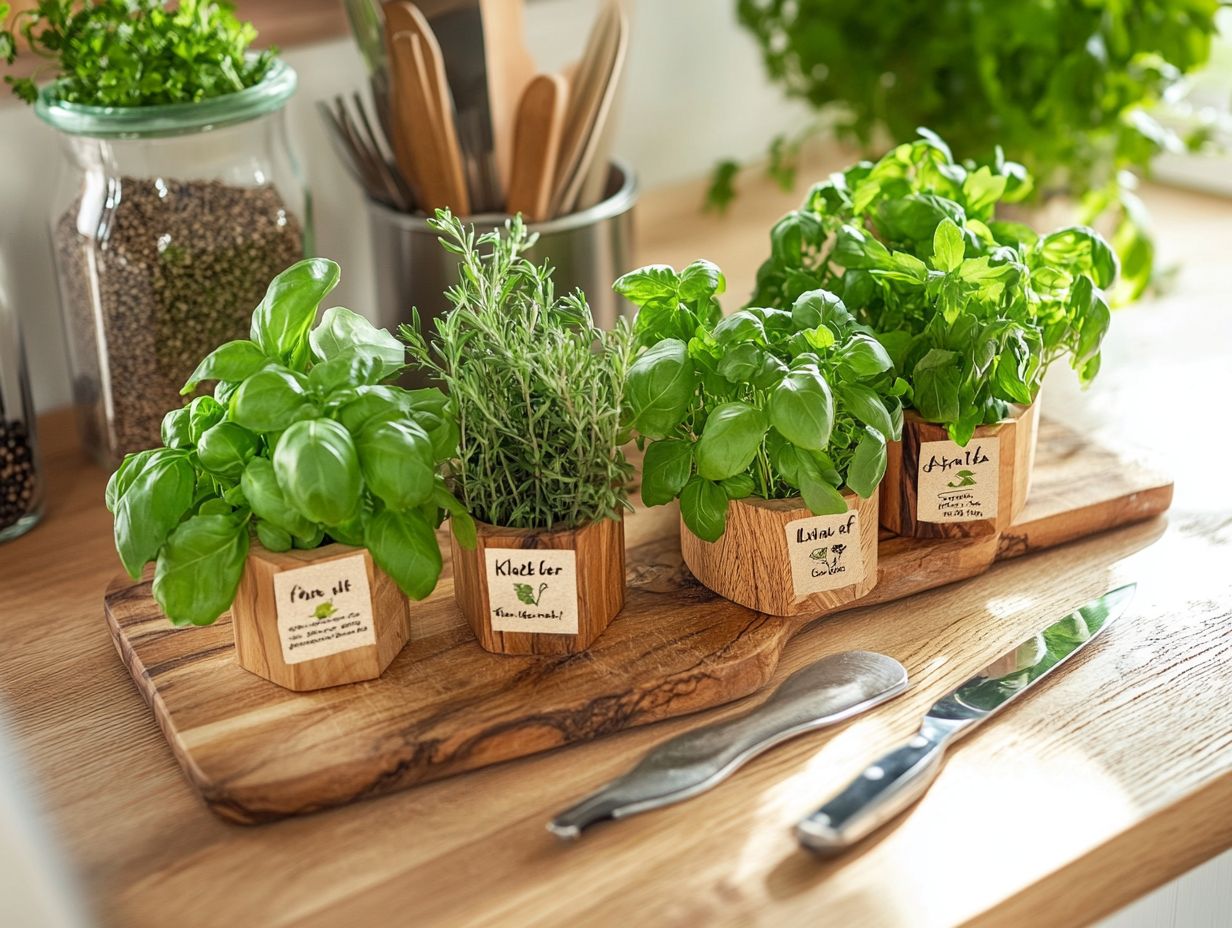
Sage is a cherished herb with a rich history, not just for its delightful flavor but also for its remarkable ability to enhance memory and cognitive function. It is a true partner for your mental wellness.
Its aromatic leaves bring an earthy richness that can elevate your dishes, especially when added to hearty roasts and savory stuffings.
Besides being a culinary gem, sage also packs a punch in the health department. This versatile herb is loaded with antioxidants substances that help protect your body from harmful free radicals. It may help shield you from cognitive decline while also boosting your memory and concentration.
In the realm of herbal medicine, sage works wonders by soothing digestive troubles and alleviating anxiety. It embodies the essence of a holistic remedy for both body and mind, making it a valuable addition to your wellness toolkit.
7. Cilantro: A Detoxifying Herb for Heavy Metal Removal
Cilantro enhances numerous cuisines, from Indian curries to Thai soups. It is not just a vibrant addition to dishes like salsa and guacamole; it is also a powerful detoxifying herb renowned for its ability to help eliminate heavy metals from your body.
Beyond its culinary appeal, cilantro is packed with antioxidants and essential vitamins, making it a true ally for your overall well-being. It promotes digestive health and has been linked to reduced inflammation.
By incorporating cilantro into your daily meals, you are not just enhancing the flavor profile; you are also supporting your body s natural detox processes. This reinforces cilantro’s reputation as a superstar in both health and gastronomy.
Start using this amazing herb today for a healthier tomorrow!
Herbs: Not Just for Garnishing; They Can Transform Your Meals and Boost Your Health!
8. Parsley: A Nutrient-Dense Herb for Bone Health
Parsley is often dismissed as merely a garnish, but it deserves attention for its nutrient-dense profile. It is brimming with vitamins and minerals that significantly enhance bone health and overall wellness.
This versatile herb shines as a star ingredient in many recipes.
Imagine finely chopped parsley in your fresh salads, adding flavor and a vibrant touch, or blended into zesty sauces like chimichurri. Its potential is truly expansive.
Besides its culinary uses, parsley has an impressive health profile. Its high vitamin K content is essential for maintaining bone strength and supporting cardiovascular health.
Packed with antioxidants, vitamins A and C, and essential oils, parsley boosts immune function and is a fabulous addition to any balanced diet.
9. Dill: A Flavorful Herb with Antioxidant Properties
Dill is a flavorful herb shining in dishes like pickles, seafood, and salads. It offers celebrated antioxidant properties that enhance its health benefits.
This herb elevates your culinary experience with a fresh aroma and vibrant notes, transforming even the simplest recipes into something extraordinary. It pairs beautifully with creamy dressings, balances the richness of grilled fish, and enhances fresh salads.
Dill also has impressive health benefits. Its high vitamin C content plays a vital role in boosting immunity, while its digestive properties can soothe gastrointestinal discomfort.
10. Chives: A Mildly Onion-Flavored Herb with Antioxidant Benefits
Chives, with their subtly onion-like flavor, are a versatile herb that adds a refreshing touch to your dishes. They offer antioxidant benefits that can enhance your overall health.
Often featured in salads, these delicate green strands provide a vibrant pop of color and a hint of zest, transforming simple ingredients into gourmet delights.
Chives contain essential nutrients, including vitamins A and C, which strengthen your immune system and support skin health.
Their potential to promote cardiovascular well-being is noteworthy, as they may help lower cholesterol levels and improve circulation.
Incorporating chives as a garnish elevates not only the visual appeal of your plate but also contributes to a nutritious and heart-healthy meal.
How to Incorporate These Herbs into Your Cooking?
Incorporating culinary herbs like basil, rosemary, and parsley into your cooking elevates the flavor and aroma of your family meals. They also offer a wealth of health benefits that support a balanced diet.
These versatile ingredients can be utilized in various forms whether fresh, dried, or infused each presenting a unique opportunity to enhance your dishes.
For instance, fresh basil shines in a Caprese salad, while dried herbs like oregano bring depth to a hearty pasta sauce. Their robust flavors blend seamlessly.
Rosemary-infused oil adds delightful complexity to simple roasted vegetables. When balanced right, these herbs enhance flavor and enrich the overall dining experience, making every meal truly memorable.
What Are the Health Benefits of Using Fresh Herbs?
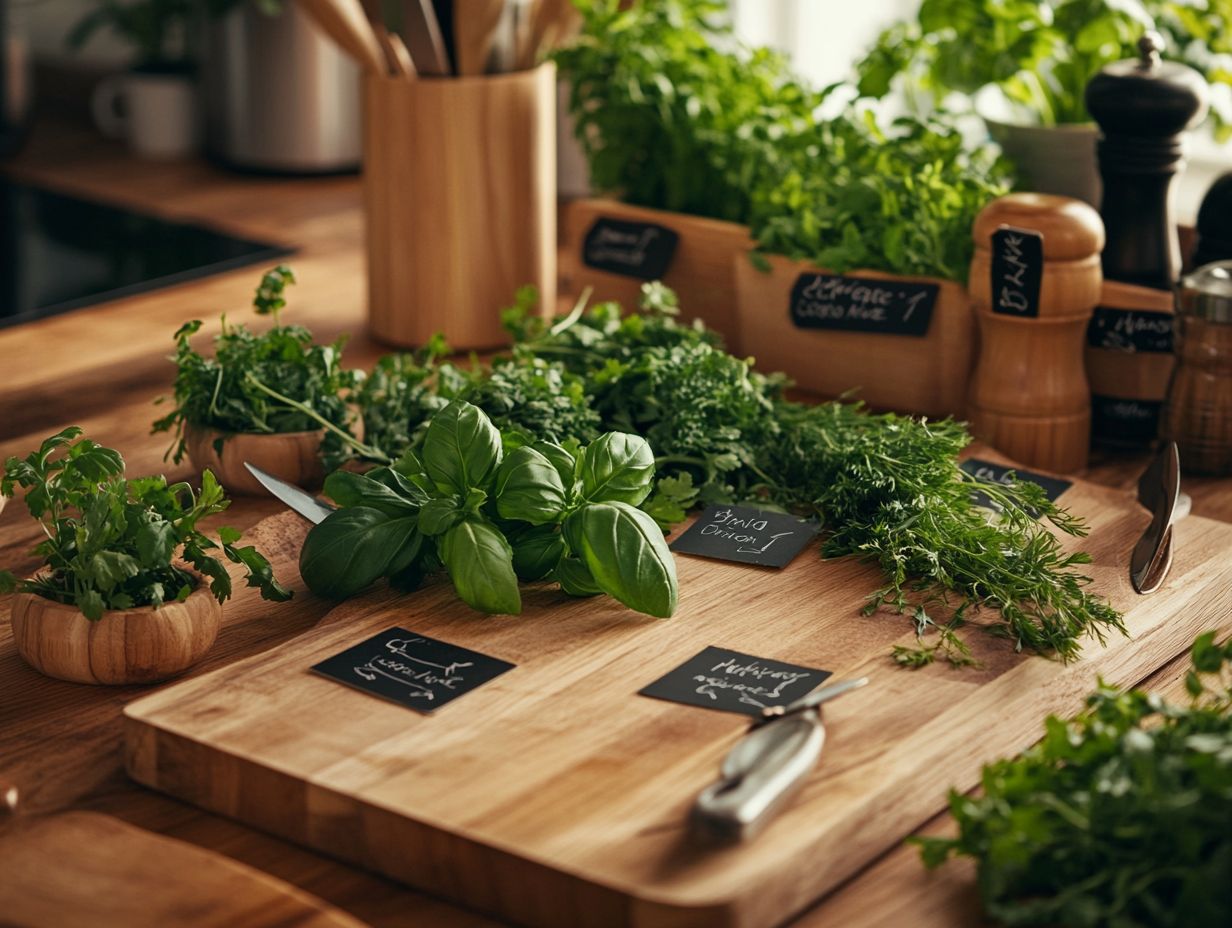
Incorporating fresh herbs into your cooking opens the door to numerous health benefits, including essential vitamins, antioxidants, and anti-inflammatory properties.
These small yet mighty plants elevate flavor and contribute significantly to disease prevention.
Basil, for example, is celebrated for its antibacterial qualities, making it an excellent choice for meals aimed at boosting immunity. Rosemary is linked to improved digestion and memory, with studies supporting its positive effects on brain health.
There is anecdotal evidence suggesting that those who regularly include herbs like cilantro and parsley in their diets may enjoy lower levels of inflammation and enhanced heart health.
Embrace fresh herbs to cultivate a lifestyle that delights the palate and promotes long-term wellness.
Try adding these herbs to your next meal and experience the difference!
Which Herbs Are Best for Different Types of Dishes?
Choosing the right herbs for your dishes can elevate the flavor profile, turning your meals into delicious gatherings.
Understanding which herbs complement various foods from robust meats to light salads can transform an ordinary dish into something extraordinary.
Aromatic herbs like rosemary and thyme pair beautifully with hearty meats, enhancing savory flavors. Delicate herbs such as basil and cilantro bring a burst of freshness to salads.
Make sure to consider not only the main ingredients but also the overall balance of flavors. A splash of lemon juice can work wonders when combined with certain herbs. Don t hesitate to experiment with different combinations.
The world of herbs is vast, and discovering unique pairings can lead you on exciting culinary adventures.
How Can You Grow These Herbs at Home?
Growing culinary herbs at home is a rewarding endeavor. It provides fresh ingredients for cooking and enhances your gardening skills.
Whether you re a seasoned gardener or a novice eager to cultivate your green thumb, this project can be enjoyable and fulfilling. Choose a sunny spot that receives at least six hours of sunlight each day, as most herbs thrive in bright conditions.
Using well-draining soil and ensuring adequate moisture can significantly boost growth. Regular pruning is key; it encourages lush foliage and keeps pesky pests at bay a common challenge in any garden.
Growing your own culinary herbs elevates flavors, promotes healthier cooking, and saves you money all while infusing your home with delightful aromas.
What Are the Potential Side Effects of Using These Herbs?
While culinary herbs can provide health benefits, it’s important to remain mindful of potential side effects, especially when used in excess or alongside specific health conditions.
Some herbs, when consumed in large quantities, may lead to gastrointestinal discomfort, allergic responses, or even serious complications.
Some common culinary herbs might interact with medications, potentially altering their effectiveness or increasing the risk of side effects. For example, garlic and ginger can thin the blood, which might amplify the effects of medications that thin the blood.
To mitigate these risks, consult a healthcare professional before making significant dietary changes, particularly if you’re on prescription drugs or have existing health issues.
Practicing moderation and staying informed will help you savor the delightful flavors of herbs safely.
How Can These Herbs Be Used for Medicinal Purposes?
Many culinary herbs also serve as medicinal herbs, offering natural solutions for various health conditions.
Take rosemary, for example. It’s not just a flavor booster; its anti-inflammatory properties can help alleviate arthritis symptoms and promote better digestive health. Research indicates that its essential oils may support cognitive function and memory retention, proving that this herb offers more than just flavor.
Turmeric, a kitchen staple, is celebrated for its active compound, curcumin. Known for its powerful antioxidant effects, studies suggest that curcumin can reduce inflammation and may play a role in cancer prevention.
These herbs show how incorporating natural ingredients into your diet can boost overall well-being, making them invaluable assets in culinary and medicinal practices.
Frequently Asked Questions
What are the top 10 kitchen herbs and their benefits?
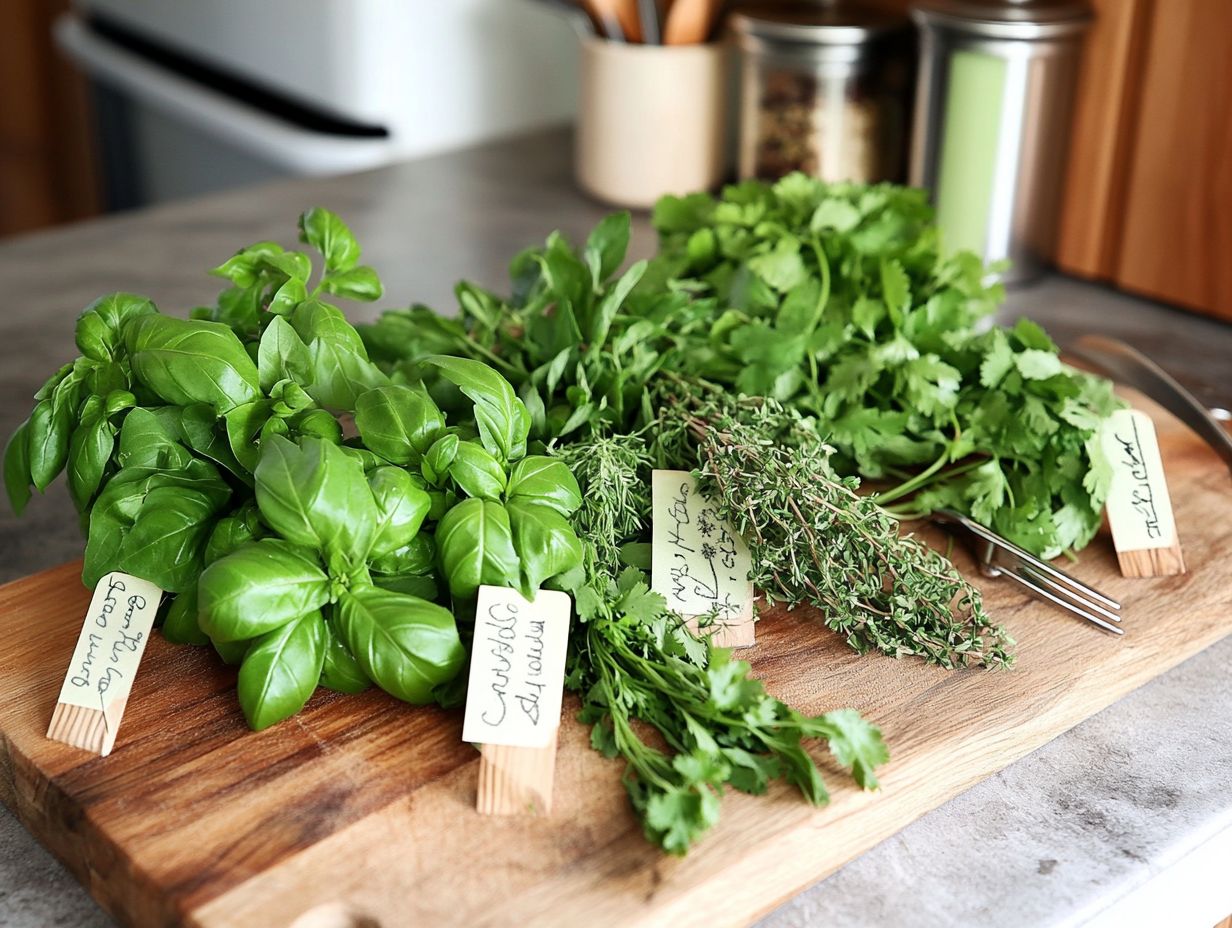
The top 10 kitchen herbs are rosemary, thyme, basil, oregano, mint, sage, parsley, cilantro, dill, and chives. Each has its unique flavor and health benefits, making them essential in any kitchen, especially when considering the top 5 herbs for cooking and health.
What are the benefits of using rosemary in cooking?
Rosemary is great for digestion and mental clarity. It also adds a delicious earthy flavor to your dishes.
How can thyme benefit my health?
Thyme fights germs and helps with respiratory health. It can also aid digestion and lower blood pressure.
Why should I use basil in my cooking?
Basil is packed with vitamins and minerals. This herb can improve digestion and promote healthy skin and hair.
What are the benefits of adding mint to my meals?
Mint helps relieve digestive issues and improves respiratory health. Plus, it adds a refreshing burst of flavor!
What are the health benefits of using sage?
Sage is rich in antioxidants and can support heart health. Its unique flavor pairs well with meats and vegetables.
Why is parsley a must-have kitchen herb?
Parsley is loaded with vitamins and can help digestion. It also adds a fresh touch to your meals.




